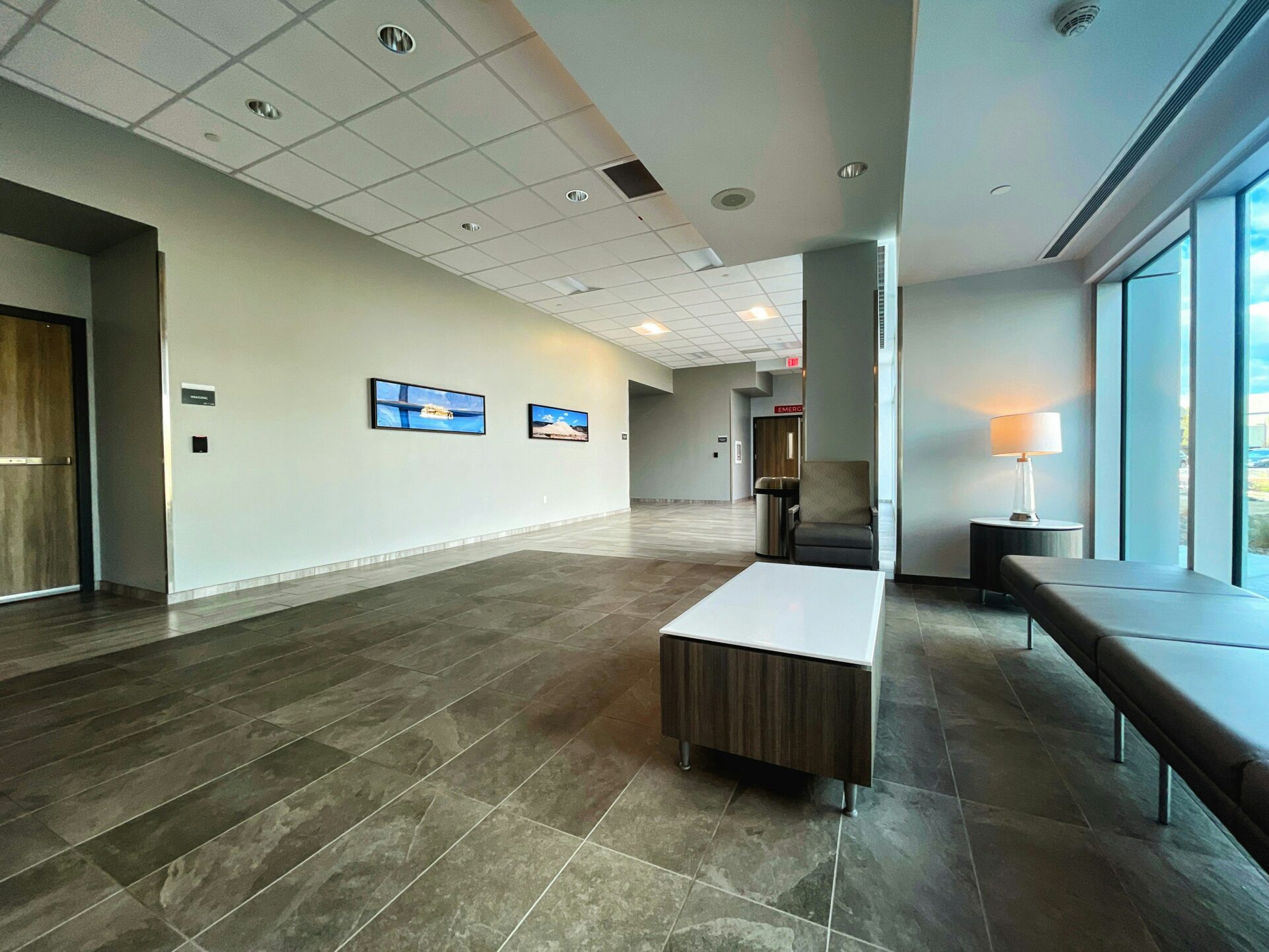August 21, 2024
Navigating the Maze: The Frustration of Finding Commercial Medical Space for Lease
- by Trevor McElhaney, JD, Director of Consulting
When it comes to setting up a medical practice, finding the right commercial space is one of the most crucial steps. The location you choose can greatly impact your practice’s success, patient satisfaction, and even your professional reputation. However, the process of finding the perfect medical space for lease is often fraught with frustration, delays, and unexpected challenges. Here’s why this journey can be so exasperating—and how to navigate the maze.
Challenges When Searching For a Medical Space For Lease
1. Scarcity of Specialized Spaces
Unlike regular office spaces, medical facilities require specific configurations. You need examination rooms, areas for specialized equipment, waiting rooms, and compliance with health regulations like ADA accessibility. Finding a property that meets these criteria can be like searching for a needle in a haystack. The scarcity of these specialized spaces means you’re often competing with other practitioners who are also on the hunt, which only adds to the pressure.
2. High Costs and Hidden Expenses
Medical spaces are generally more expensive than standard commercial leases—and for good reason. These spaces often require significant upfront investments for tenant improvements to accommodate medical equipment, specialized plumbing, and electrical needs, as well as ensuring compliance with strict healthcare regulations. Landlords factor these costs into the lease, driving up the price. Additionally, medical tenants are often seen as lower-risk, given the stable nature of the healthcare industry, which can justify higher rents. Beyond the base rent, there are often hidden expenses like common area maintenance (CAM) fees, utilities, and costs associated with compliance upgrades. These additional costs can quickly add up, turning what seemed like a reasonable lease into a financial burden.
3. Long Negotiation Processes
Even if you find a space that seems ideal, the negotiation process can be painfully slow. Landlords often demand long-term leases, which can be risky if your practice doesn’t grow as anticipated. Moreover, negotiating tenant improvement allowances (TIA) for necessary modifications can take weeks, if not months. This back-and-forth can delay your plans significantly, leaving you in limbo.
4. Zoning and Regulatory Hurdles
Medical practices are subject to stringent zoning laws and health regulations. Even if you find a space that suits your needs, you may discover that it’s not zoned for medical use. Obtaining the necessary permits and ensuring compliance with local, state, and federal regulations can be a bureaucratic nightmare, further delaying your move-in date.
5. Limited Availability in Prime Locations
Prime locations—those near hospitals, in high-traffic areas, or within medical complexes—are always in demand. Finding available space in these coveted areas is challenging. When you do find something, it’s often overpriced or requires significant compromises, such as accepting a less-than-ideal layout or signing a longer lease than you’re comfortable with.
Navigating the Frustration of Finding a Medical Space For Lease
While the process of finding a medical space for lease can be frustrating, there are strategies to ease the journey and increase your chances of securing the perfect location for your practice:
1. Start Early and Plan Ahead: Give yourself plenty of time—months, if not a year—to find the right space. The earlier you start, the more options you’ll have, and the less pressure you’ll feel to make a hasty decision. This lead time allows for a thorough search, negotiation, and any required build-outs or renovations without rushing.
2. Work with a Specialized Broker: A commercial real estate broker with experience in medical spaces can be invaluable. They understand the market, know where to look, and can often negotiate better terms on your behalf. A specialized broker can also help you identify potential red flags early in the process, saving you time and money.
3. Be Clear on Your Needs and Priorities: Before you start looking, have a clear list of your must-haves, such as the number of exam rooms, square footage, and specific location preferences. This clarity will help narrow your search and avoid wasting time on unsuitable properties. It’s also important to prioritize these needs—know what you absolutely cannot compromise on versus what you can be more flexible about.
4. Consider Flexibility and Alternative Options: While it’s essential to have a clear vision, some flexibility can open up more options. For instance, consider whether you might be open to leasing a space in a non-traditional location, such as a converted retail space or a mixed-use development. These spaces can sometimes offer lower costs or unique benefits like increased foot traffic. Additionally, think about whether you can adapt your practice model to fit a slightly different space configuration.
5. Leverage Technology and Data: Use technology to your advantage during your search. There are numerous online platforms and databases that can help you find available medical spaces, often with detailed information on zoning, square footage, and amenities. Additionally, consider using data analytics to assess the potential of different locations in terms of patient demographics, competition, and accessibility.
6. Negotiate Smartly: Don’t be afraid to negotiate lease terms that better suit your needs. This could include requesting a shorter lease term with renewal options, negotiating for a higher tenant improvement allowance to cover necessary renovations, or asking for rent concessions during the build-out period. A specialized broker can be particularly helpful in these negotiations, ensuring you get the best possible deal.
7. Plan for Contingencies and Have a Backup Plan: Prepare for potential delays or setbacks by having a contingency plan. Whether it’s extending your current lease, having a temporary setup, or identifying alternative spaces, being prepared can reduce stress if things don’t go as planned. Additionally, consider the long-term needs of your practice—if growth is on the horizon, plan for how your space can accommodate expansion, or explore options that offer future expansion potential.
8. Seek Legal and Financial Advice: Engage with legal and financial professionals who specialize in commercial real estate and healthcare law. They can help you navigate complex lease agreements, understand your financial obligations, and ensure that you’re protected from potential pitfalls. This extra layer of scrutiny can save you from costly mistakes down the road.
9. Stay Patient and Persistent: Finding the right medical space is a significant investment in your practice’s future. While the process can be slow and frustrating, it’s important to stay patient and persistent. Rushing into a lease agreement just to secure a space can lead to regrets later on if the location or terms don’t fully meet your needs. Keep your long-term goals in mind, and trust that the right space is out there.
10. Engage with the Local Community: If you’re relocating or starting a new practice, take the time to engage with the local community where you’re considering leasing space. Understanding the community’s needs, healthcare gaps, and patient demographics can provide valuable insights that guide your decision. Additionally, building relationships with other local healthcare providers and businesses can create a supportive network that benefits your practice.
Work With Experts to Navigate This Complex Process
Finding the perfect medical space for lease is rarely a straightforward process. The scarcity of suitable properties, high costs, regulatory hurdles, and lengthy negotiations can all contribute to a frustrating experience. However, by starting early, working with experts, and staying flexible, you can navigate this complex process and ultimately find a space that meets your needs and supports the success of your practice. Remember, the right space is out there—it just might take a little extra time and patience to find it.

























